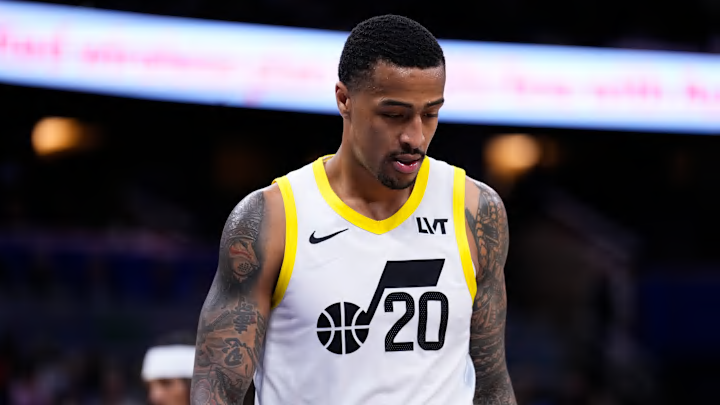Several narratives surrounding the Utah Jazz have been beating a dead horse at this point. One of them is the prospect of trading John Collins.
It's been well-established by now that Collins' contract has negative value due to being overpaid for what he brings. It was a fun idea to acquire him since the Jazz weren't sure where they were going, but now that they do, there's no need for Collins.
He could surprise for the Jazz, but the only way that that would matter is if the Jazz could then use his performance to trade him. Because they shouldn't count on that, if a trade involving Collins happens, expect the Jazz to use some picks.
If they go that route, Bleacher Report's Grant Hughes explained why he could see Collins being sent to the Portland Trail Blazers. Hughes explained that Collins would come with picks attached, which adds to why he works for them as a trade target.
"That's the beauty of Portland's situation; it can also operate as a dumping ground (for draft picks) if it wants to.
"Any team with bad salary and picks to deal could come to the Blazers and find myriad trade options. Portland could extract at least one high-value first-rounder or a couple of lower-upside selections in exchange for taking on Collins' deal."
He didn't explain it from the Jazz's perspective, but Portland is an intriguing destination for Collins.
The Jazz have picks to spare
The Jazz are embracing their rebuild, meaning they're adding youth by the barrelful, and they will likely add more in the coming years. However, if they don't get rid of some of those picks, they will have too much. For a time, Danny Ainge had this problem in Boston while assembling what would turn into a winning roster.
Minnesota and Cleveland will be good this season. Pending any unforeseen injuries, they'll likely give Jazz some late first-round picks in 2025 when it's all said and done. Though Ainge has an excellent track record drafting, it's harder to find keepers late in the draft.
It's a tough pill to swallow to trade picks along with Collins since the Jazz didn't get any picks when they took him off Atlanta's hands, but to prevent them from having a few too many young players on the roster, trading Collins to Portland could help on that front.
Collins could make Portland better, helping Utah's tanking efforts
Just because Collins is overpaid doesn't mean he's a bad player overall. He's not. He has proven in the past that he is a starting-caliber center for playoff teams that went somewhere. If the Trail Blazers get him, he could make them slightly better to the point where they would be better than the Jazz.
Trading Collins would also make the Jazz depend on lesser or not as proven players like Drew Eubanks or Kyle Filipowski. Eubanks is a solid backup big, and Filipowski has looked intriguing during preseason, but are they as good as Collins? Currently, no.
The Jazz still have Lauri Markkanen and Walker Kessler, but taking Collins out of the equation would be a tough hit to their frontcourt rotation. A tough but necessary hit knowing their aspirations to tank.
The one problem with trading Collins to Portland
Even though there is a lot of appeal to sending Collins to Portland, what would Utah get back for him? Portland has multiple centers, so trading Collins there would only make sense for them if one of their centers is going back out. DeAndre Ayton makes little sense in Utah because he, too is overpaid. Robert Williams would make sense, as he is paid much less and has value.
It would take more than him though, as the Jazz would have to take someone else, like Matisse Thybulle. The Jazz don't have much use for them, but if they can rework for them for expiring contracts, that would open up cap flexibility.
The Jazz don't need that per se, but they don't need Collins, and if a scenario like this presents itself, it's hard to see why Utah would pass on it.
